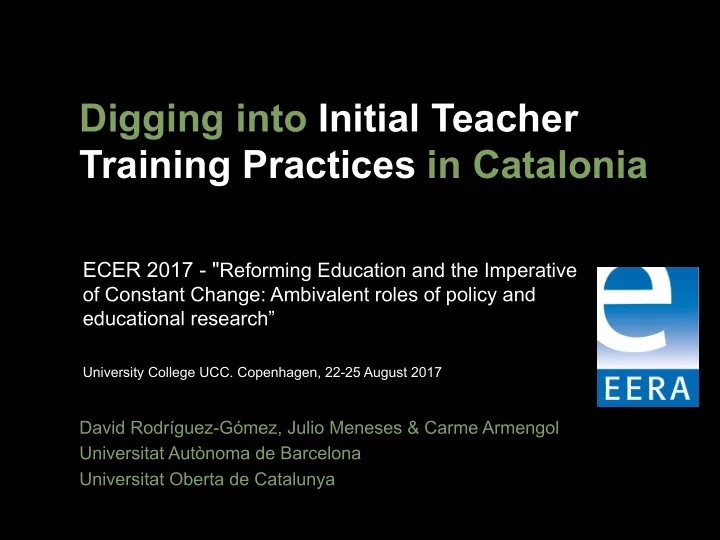

Digging into Initial Teacher Training Practices in Catalonia ECER 2017 - " Reforming Education and the Imperative of Constant Change: Ambivalent roles of policy and educational research” University College UCC. Copenhagen, 22-25 August 2017 David Rodríguez-Gómez, Julio Meneses & Carme Armengol Universitat Autònoma de Barcelona Universitat Oberta de Catalunya
Introduction Teacher training is a fundamental element in the improvement of the quality of our educational system. Curricular and professional internships, are essential for both: • the development of skills and the consolidation of knowledge (Bretones, 2012; Egido & López, 2016; Kilgo, Sheets, & Pascarella, 2015) • and for subsequent professional integration (Helyer & Lee, 2014; Pineda, Agud & Ciraso, 2016) In the case of teacher training, there is practically no research that provides empirical proof of the factors that lead to a better acquisition of skills during the internship period, or the conditions needed so that these training periods take place with the fullest guarantees
Method identify the factors contributing to a greater acquisition of skills during the internship period in the Early Childhood Education and Primary Education Bachelor’s degrees. perceived characteristics satisfaction impact on the of the expressed by institutions practicum the students and people
Method questionnaire (N=567 students): Primary Education (n=276) and Early Childhood Education (n=291 ) 1. Sociodemographic characteristics and characteristics of the internship school (age, gender, bachelor’s degree, university entrance, ownership of the school) 2. Characterization of the internship programme (placement in the degree, type of practicum –extensive, intensive-) 3. Satisfaction with the internship 4. Perceived impact of the internship 5. Students’ skill development univariate and bivariate descriptive analysis & three multiple regression models, one for each type of skill considered in the study: (1) relationships and ways of working, (2) classroom management and (3) the application of knowledge in practice.
Results M SD q skills associated with Skills related to relationships and ways 3.06 0.65 classroom of working (1) Skills related to classroom management are the 3.46 0.57 management (2) most developed Skills related to the application of 3.11 0.62 knowledge in practice (3) q students are very Satisfaction with the practicum as a 2.91 0.51 satisfied with the subject (4) relationship Satisfaction with the relationship established with the 3.41 0.69 established with the internship centres internship centres (5) Satisfaction with the organization of 2.64 0.61 the practicum (6) q the perceived impact Satisfaction with the information about of the practicum on 2.73 0.58 the practicum (7) the students’ Perceived impact on the classroom 3.11 0.64 development as and school activity (8) future educational Perceived impact on professional 3.79 0.43 professionals seems development (9) clear Perceived impact on the school- 2.91 0.72 university relationship (10)
Results q the sociodemographic variables and the ownership of the school are not associated with the development of skills during the internship periods q those practicum programmes that combine intensive and extensive periods seem to be statistically associated, although weakly, with a greater development of the skill of application of knowledge in practice
Results q increase in the satisfaction levels reported by the students is a significant predictor of the development of skills linked to relationships and ways of working q in relation to classroom management, only satisfaction with the relationship established with the internship centres is significantly associated q positive assessment of the practicum as a subject and of the relationships with the internships centres is significantly associated with a greater application of knowledge in practice
Results q higher perception of the impact of the practicum on the classroom and school activity, the students’ professional development and the school-university relationship is associated with the development of the skills associated with relationships and ways of working, as well as a greater application of knowledge in practice. q classroom management skills are more developed among those students who perceive a greater impact of the internship on the classroom and school activity and, particularly, on their own professional development.
Some conclusions… a satisfactory internship and the perception of a positive impact of the internship predicts, from the perspective of the students themselves, a greater development of skills that may be useful for the subsequent carrying out of the teaching profession. importance of “training centres” (e.g., Conroy, Hulme & Menter, 2013). Building the loyalty of the internship centres takes on a special meaning with this idea, and opens up a dilemma: (1) students’ freedom of choosing internship centres vs. (2) possibility of establishing a stable network of centres. importance of a suitable cooperation between schools and universities, where the former help to develop the teaching skills in a real context, and the latter not only provide students with access to relevant research in their professional field, but they also promote a critical reflection of the practice (Burn, 2006).
Thank you very much! david.rodriguez.gomez@uab.cat http://femrecerca.cat/drodriguez/ @deiph
Recommend
More recommend